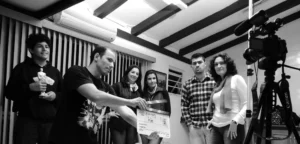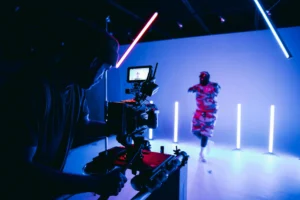Film Production Placements
A Way to Get into the Movie Business
The world of making movies is exciting, fast-paced, and always changing, yet getting in may be scary. Film production assignments are one of the best methods to get real-world experience in this field. These changes help students connect what they study in school with what they do in the real world. They provide aspiring filmmakers, editors, producers, and cinematographers an opportunity to acquire new skills, create connections, and see what goes on behind the scenes in the business.
In this blog post, we’ll talk about what film production placements are, how to secure one, and how they might help your career in media or filmmaking.
What Are Film Production Jobs?
A film production placement is a short-term job that a film studio, production house, or media organization offers. It’s meant to provide students, new grads, or even self-taught artists an opportunity to collaborate with pros in the film business.
Some of these positions may only last a few weeks, while others may last many months. The roles also change and might include:
- Jobs as an assistant director
- Reading and modifying scripts
- How to use a camera or light
- Editing and post-production
- Coordinating production
- Art direction and set design
- Selling and getting the word out
They may be part-time or full-time, paid or unpaid (though paid placements are becoming more prevalent), and if the applicant does well, they may be able to get a position in the future.
Why are Film Production Placements Important?
A placement gives you something that no classroom or tutorial can: real-world experience. This is important in an industry that values practical skills and addressing problems in the real world. Here’s why they’re so useful:
1. Learning new skills
Placements help you improve both your hard and soft abilities. You’ll learn how to utilize the same tools, software, and procedures that pros use, from handling film equipment to understanding how to deal with tight shooting timelines.
2. Networking in the industry
You will work with directors, producers, editors, and other crew members, who might be useful contacts in your future job. Networking might help you go ahead in a field where relationships are important.
3. Improving Your Portfolio
Including a professional placement on your CV or portfolio indicates that you have worked in a genuine production setting. You could even get to see your name in the credits, which is a great way to strengthen your résumé.
4. Career Path
Placements may help you figure out what part of film production you want to work in, such as directing, scripting, cinematography, editing, or something else.
Different kinds of film production placements
The kind of placements you may get depends a lot on the firm, the size of the project, and what you want to do. Here are some typical types:
1. Placements in a studio
These are usually with big movie companies or TV networks like Warner Bros., Netflix, or BBC companies. These jobs may be quite competitive, but they provide you with a structured place to study and let you see how big productions work.
2. Independent Film Jobs
If you work with independent filmmakers or small production firms, you may have more hands-on tasks. You may have to do a lot of different things, which is great for learning rapidly.
3. Partnerships between schools
A lot of film schools and media programs work with production companies. These placements are meant to go along with your classes and may even be required for graduation.
4. Houses for Post-Production
If you want to learn more about editing, sound design, or VFX, applying for a job with a post-production business might provide you with a lot of information about what occurs after the shoot is over.
5. Internships at Film Festivals
If you work behind the scenes at film festivals like Sundance, Cannes, or your own local indie festival, you’ll learn about the economic side of creating movies, such as how to promote, market, and distribute them.
How to Get a Job in Film Production?
Getting a job in the film business takes work, determination, and some planning. Here are some things you can do to improve your chances:
1. Make a strong portfolio
Put together a portfolio of all the student films or short YouTube videos you’ve made. Add:
- Scripts
- Short movies
- Editing reels
- Setups for lighting
- Pictures from behind the scenes
This demonstrates that you are proactive and skilled.
2. Do research and use it wisely
Find businesses that are in line with what you like. If you love documentaries, for example, you should focus on documentary production firms instead of major commercial studios.
Sites like:
- Mandy.com
- ProductionHUB
- The Dots
- Film Near You
LinkedIn often posts job and internship openings.
3. Make a CV and cover letter that are specific to the job.
Make sure to tailor your application for each job. Talk about your abilities, past experiences (including school ones), and, most importantly, your love of producing movies.
4. Use the resources at your school or university
If you are in a film or media program, speak to your academic counselors or the career center. They typically offer special linkages to job openings.
5. Connect
Go to local film festivals, online classes, or film meetups. A coffee chat might often lead to a chance to help out on a set.
What to Expect During Your Placement
Placement isn’t simply about getting coffee (though that may happen, too). Here is what a normal day would look like:
- Helping the director or producers on-site
- Taking care of film gear or props
- Going to meetings before production
- Looking at video and putting files in order
- Watching or helping with color grading and editing
- Helping to plan the shooting schedule
- Keeping track of papers or submitting release forms.
You will probably get additional tasks the more dedicated you are.

Benefits After You Get a Job
Getting a job in film production typically gives you more than simply experience:
- Job Offers: Many organizations hire their finest interns full-time.
- References: Your boss might be a great reference.
- Freelance Work: Even if you don’t have a full-time job, people may still spread your name around for freelance work.
- Festival Credits: If you worked on a movie that goes to festivals, you can get a screen credit.
- Confidence: You’ll leave with a better idea of what you’re good at, what you like, and how the business operates.
5 Questions That Are Often Asked
1. Do placements in film production pay?
Some placements pay, particularly those with bigger studios or productions that get money from somewhere else. But a lot of small firms provide unpaid internships that come with benefits like networking, learning, and getting credit.
2. How long does a normal placement last?
The length of placements might range from two weeks to six months. The length of time depends on the project, the firm, and what the parties agree on.
3. Can I obtain a job without a degree in film?
Yes! A degree in cinema or media may assist, but many jobs are accessible to anyone with experience, a solid portfolio, and a love for the field. A lot of self-taught artists achieve well in the independent cinema industry.
4. What skills do I need to have before I apply?
It helps to know a little bit about film equipment, editing software (such as Premiere Pro or Final Cut), and how to behave on set. Teamwork, communication, and time management are all key soft skills.
5. Where can I get internships in film production?
You may look for jobs on sites like Mandy.com, ProductionHUB, The Dots, Indeed, and even Reddit. Local film commissions and university career services often list job vacancies.
In conclusion
Film production jobs are more than simply internships; they may make or break your career. They provide those who want to work in the field a chance to get real-world experience, build contacts, and get their foot in the door for years to come.
If you want to work in cinema as a director, editor, scriptwriter, or in any other field, a production placement might be the first major step toward making your creative passion a successful profession. So get started on your portfolio, look into job openings, and go for it—the film business needs your distinctive voice.
